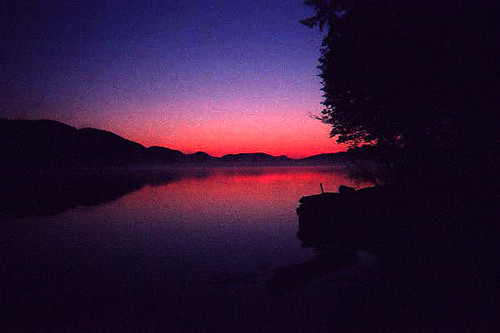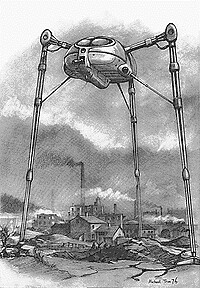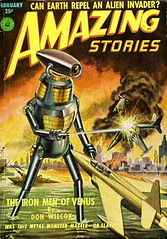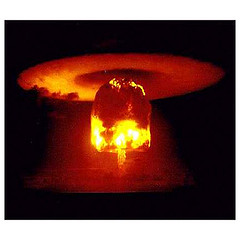But in another 24 hours or so I'll be putting it all behind me to head for the Adirondacks and hide out on an island for the national birthday---a place you can only get to by kayak, where the views will look something like this:

We will then pitch our tent, and weather willing, lay back under the Milky Way (which I can never see where I live) with homemade sangria, and put all this madness aside for a little while. We will read nothing but field guides, listen to nothing but loons and an ocasional wolf, and pretend for a little while that the world is a safer place than it is, or at least only dangerous in a way that makes sense.
 If I were planning to stay home for the holiday, I might get out and give "War of the Worlds" a shot. I'm not a big Tom Cruise fan, and Spielberg's hothouse perfections can really grate, but the advance word intrigues the misanthrope in me. The H.G. Wells novel is a sustained threnody of terror that plugs directly into that part of the unconscious where fear of spiders and falling out of trees resides. What could be more frightening than the unstoppable onslaught of monstrous mechanical things aping vague life-forms, spreading through the countryside and targeting you for death simply because you live? (Seeing enemy tanks and APVs rumbling through your hometown probably does the same thing, except that it's real, and we do it to ourselves, over and over and over again).
If I were planning to stay home for the holiday, I might get out and give "War of the Worlds" a shot. I'm not a big Tom Cruise fan, and Spielberg's hothouse perfections can really grate, but the advance word intrigues the misanthrope in me. The H.G. Wells novel is a sustained threnody of terror that plugs directly into that part of the unconscious where fear of spiders and falling out of trees resides. What could be more frightening than the unstoppable onslaught of monstrous mechanical things aping vague life-forms, spreading through the countryside and targeting you for death simply because you live? (Seeing enemy tanks and APVs rumbling through your hometown probably does the same thing, except that it's real, and we do it to ourselves, over and over and over again). One of the most terrifying and fascinating movies I remember seeing as a little kid was about giant robots who came to a city and laid waste to the inhabitants. Where did they come from? Why did they hate us? There were no answers, and none needed in that Cold War era of permanent paranoia. I grew up learning that simply being alive was enough to make those not like me want to kill me, whether they were giant robots or Russians. And what better time to re-visit those old horrors than in this brave new world of terrorism-with-a-trademark, where George Bush is working hard to give us the same free-floating anxieties that worked so well for Harry Truman, and have bloated to bursting the thousand defense industries that profited so greatly during the last World War?
One of the most terrifying and fascinating movies I remember seeing as a little kid was about giant robots who came to a city and laid waste to the inhabitants. Where did they come from? Why did they hate us? There were no answers, and none needed in that Cold War era of permanent paranoia. I grew up learning that simply being alive was enough to make those not like me want to kill me, whether they were giant robots or Russians. And what better time to re-visit those old horrors than in this brave new world of terrorism-with-a-trademark, where George Bush is working hard to give us the same free-floating anxieties that worked so well for Harry Truman, and have bloated to bursting the thousand defense industries that profited so greatly during the last World War? The Village Voice's reviewer, Michael Atkinson, makes much of Spielberg's harkening back to 9/11; the destruction in the movie seems possibly exploitive to him. But any movie whose central premise is mass destruction will have scenes that you can't help link to 9/11. And we do have a predilection for that sort of cinematic bombast that considerably predates 2001. (Strange, isn't it, that one of the two years we link to literature and cinema--"1984", "2001: A Space Odyssey"--has turned out to have been a harbinger after all;. just not the kind Stanley Kubrick intended.) More likely to me is that we externalize our fears into the stories we tell ourselves, and nowhere is that more obvious than in horror movies and books. If nothing else, it helps us see ourselves and offers a way to collectively brainstorm solutions by seeding the public consciousness.
The Village Voice's reviewer, Michael Atkinson, makes much of Spielberg's harkening back to 9/11; the destruction in the movie seems possibly exploitive to him. But any movie whose central premise is mass destruction will have scenes that you can't help link to 9/11. And we do have a predilection for that sort of cinematic bombast that considerably predates 2001. (Strange, isn't it, that one of the two years we link to literature and cinema--"1984", "2001: A Space Odyssey"--has turned out to have been a harbinger after all;. just not the kind Stanley Kubrick intended.) More likely to me is that we externalize our fears into the stories we tell ourselves, and nowhere is that more obvious than in horror movies and books. If nothing else, it helps us see ourselves and offers a way to collectively brainstorm solutions by seeding the public consciousness.On the other hand, if all this is too much like fantasy, there is always James Wolcott's favorite buzzkill, Jim Kunstler, inveighing against our fossil fuel-guzzling ways over at Clusterfuck Nation:
"Oil's remorseless up-ratcheting past $60 is as much a symptom of a weak dollar as a strained global energy allocation system, and the dollar is weakening because the way of life it represents is becoming more and more unreal. The harsh truth is that we've reached the limit of our ability to expand our suburban sprawl economy and there is no alternative US economy in the background ready to take its place. The world can't fail to notice this weakness. The inability to generate even fake wealth, in the form of ever more WalMarts, will take its toll on the consensus that the American Dream has enduring value.Ah. Good times, eh? Who needs a giant robot or a fleet of homicidal alien APVs when we've got...humanity!
The stock market contraction ought to reflect this reality -- apart from desperate attempts by US government proxies to levitate share prices -- and it is hard to imagine a rally in the face of $60 oil. I'm inclined to predict a gruesome journey down for the Dow Jones into the 4000 range by the end of the year. Until now the dollars created by the Federal Reserve's supernaturally loose credit policy have sought shelter in the "hard assets" of houses? A meltdown of the stock markets will translate into vanishing leverage in all other areas of finance, especially in real estate (as well as a swath of destruction through hedge funds, retirement accounts and, eventually, the entire creaking superstructure of the hallucinated mortgage industry). A few Americans are actually going to get the message that this is not a good time to buy an overpriced raised ranch house. A lot of real estate geniuses are going to witness their own ruin with wonder and nausea."
And that's why I'm going to paddle off into the sunset and forget all this. See you next week.





No comments:
Post a Comment